Following our latest podcast episode, Aaminah Y. and Ayah Aboelela have curated a reading list for aspiring Islamic history buffs. Whether driven by the Islamic imperative to know our past, searching for answers to historical controversies or just looking for entertaining anecdotes, Islamic history provides something for everyone. So where does one start?
Before diving in the deep end with Imam Tabari’s 40 volume Tarikh al-Rusul w’al-Muluk, this list highlights some easier reads, from classical texts to modern compilations, that nonetheless present our monumental past in all its glory and sow the seeds of curiosity. For those seeking another medium to learn about Islamic history, don’t miss the podcast and book club recommendations at the end.
Have a title you think we should read? Comment down below or let us know on Twitter @QarawiyyinProj.
Read our previous recommendations here
1) The Muqaddimah
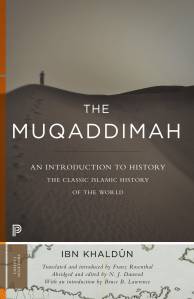
By virtue of its name alone, it makes sense to start with the Muqaddimah, Ibn Khaldun’s Prolegomena. Ibn Khaldun’s magnificent knowledge on the Abrahamic religions, Greek and Roman literature and geopolitics differentiates this from simply retelling past narratives. Ibn Khaldun sidesteps the usual reduction of history to wars and conquests to focus on the everyday, the societies, the ordinary. He exposes us to past cultures, conflicts and communities and uses them as case studies for his critique on civilisation building, delving deep into sociology, philosophy and economics.
Most fascinating is his theory of asabiyyah, meaning social solidarity or clannism. Through a focus on shared purpose, consciousness and social cohesion, asabiyyah establishes leadership and allows for the rise of dynasties and civilisations, whilst also often contributing to their inevitable downfall: a cyclical phenomenon.
Unsurprisingly, the Muqaddimah has been endorsed by many a historian, but it also comes recommended by billionaire entrepreneur Mark Zuckerberg, who praises its focus on the flow of society, culture and science.
Length: 480 pages
Highlight:
Throughout history, many nations have suffered a physical defeat, but that has never marked the end of a nation. But when a nation has become the victim of a psychological defeat, then that marks the end of a nation.
2) Lost Islamic History
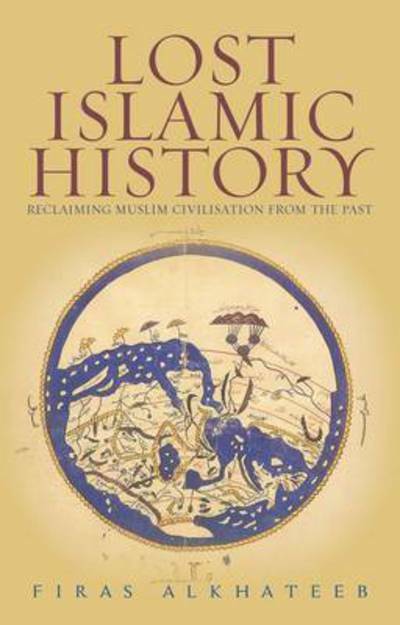
Lost Islamic History is one of the most up to date and relevant guides to Islamic history. Offering a wide-spanning overview of our past, it starts chronologically with the life of the Prophet ﷺ and the four Rightly Guided Caliphs, and travels across the various Muslim empires, from the Abbasids to the Andalusians, the Mughals to the Mamluks.
An easy and enjoyable read, the book is succinctly informative without the heavy details. While the more noteworthy events of establishing empires, military victories and political conquests are discussed at length, the author also highlights key personalities, scientific accomplishments, ideologies and socio-cultural trends.
It concludes with a brief discussion on the state of the modern Islamic world, namely the attempts at dealing with the impacts of colonialism, the Skyes-Picot agreement, and secularisation. Accessible and inclusive with a comprehensive bibliography, Lost Islamic History is a great introduction to the many facets of our past!
Length: 263
Highlight:
Perhaps the most striking feature of the Alhambra is the motto of the Emirate of Granada, which is plastered all over its walls: Wa la ghalib illallah, meaning ‘And there is no victor except God’. It was a fitting slogan for a state that represented the only vestige of the once-great Muslim civilization of al-Andalus. Even as enemy forces surrounded the vulnerable Granada, the slogan reminded the faithful of their belief in an Omnipotent God that cannot be defeated, regardless of the political decline of the peninsula. Perhaps most ironically was the fact that the slogan about God’s ultimate victory remained on the walls of the palace, even as the victorious Christian kings occupied it after the fall of the city in 1492.
3) Saviours of the Islamic Spirit
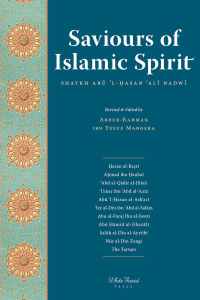
With the challenges of today, we can fall into the trap of longing for the past as a better and simpler time. Yet through the hopeful and uplifting words of Shaykh Abul Hasan Ali Nadwi, we learn that the people of the past also faced new ideas, ideologies and trials, and still emerged victorious.
Undoubtedly, the individuals discussed are not “average” Muslims – Hasan al-Basri, Umar ibn Abd al-Aziz, al-Ghazali, and Salah ad-Din al-Ayyubi among others are certainly far from typical! But Shaykh Abul Hasan Nadwi gives us a glimpse into their lives and efforts, allowing us to see the heroes of our history in a way that is relevant to our times. He outlines how different ideologies were developed, embraced or rejected and their practical implementation through the ages. Laying out the diverse worldviews of these scholars and leaders, he illustrates through historical context how we as Muslims should navigate the relationship between rational sciences, philosophy and Islam.
Shaykh Abul Hasan Ali Nadwi unapologetically recounts our history with great sincerity and emotion, earnestly celebrating these figures for their efforts in preserving Islam, be it on the battlefields or in the books.
Length: 267
Highlight:
These scholars relentlessly fought against the forces of corruption, defended Islamic precepts and teachings, and rejuvenated the spirit of Islamic revival… My aim is to present an account of the continuous effort made during the past thirteen hundred years to stimulate a spirit of reawakening among the Muslims, and to bring to light those eminent people who rose to the defense of Islam in order to repelthe assault of evil forces, who gave birth to various movements for upholding Islamic morals and values, and, finally, whose efforts made it possible for Islam to survive to this day.
4) The Book of Contemplations
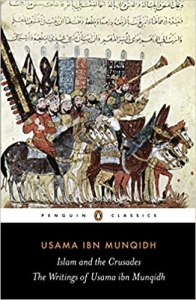
Christians and Muslims, war and death — this makes up the basis of our very eurocentric understanding of the Crusades. But beyond the conflict, what was happening in the moments there was no fighting? Who were these individuals beyond their warrior status? What was their ethos, their worldview? This is where the fun is!
Paul Cobbs does a splendid job in his translation of Usama Ibn Munqidh’s Kitab al-I’tibar, where Usama relays the crusades through his experience as a devout muslim, a warrior and a poet. Beyond the epic tales of fighting the Franks, he gives us insight into the culture and traditions through hilarious anecdotes full of wisdom. Featuring various characters from badass brigands to notorious noblemen, his witty observations add a whole new dimension to our perception of the Crusades. He demonstrates the culture clash, from their temperaments to how they treated women. Most amusing is how he sometimes expressed his fondness for the Frankishmen and their chivalrous ways, whilst making sure to supplement it with a reminder that they were still the enemy. Most heartwarming is when he speaks of the strong theological influence he grew up with in Syria, the framework of Islam underpinning every experience, and repeatedly appreciating Allah’s mercy.
Living well into his nineties, Ibn Munqidh collated a plethora of reflections on religion and society, victory and loss, camaraderie and betrayal into his Book of Contemplations, written for his final patron, the great Salah al-Din. The warmth of his wise words will engulf you and the absurdity of his anecdotes will have you chuckling — an absolute wizard with words.
Length: 400 pages
Highlight:
Anyone who is recently arrived from the Frankish lands is rougher in character than those who have become acclimated and have frequented the company of Muslims. Whenever I went to visit the holy sites in Jerusalem, I would go in and make my way up to the al-Aqsa Mosque, beside which stood a small mosque that the franks had converted to a church.
One day I went into the little mosque, reciting the opening formula, ‘God is great!’ and stood up in prayer. At this, one of the Franks rushed at me and grabbed me face towards the east saying, ‘Pray like this!’ A group of templars hurried towards him, took hold of the Frank and took him away from me. The Frank, the very same one, took advantage of their inattention and returned, rushing upon me and turning my face to the east’. So the templars came in again, grabbed him and threw him out. They apologised to me, saying ‘This man is a stranger, just arrived from the Frankish lands sometimes in the past few days. He has never before seen anyone who did not pray towards the east.
‘I think I’ve prayed quite enough’ I said and left. I used to marvel at that devil, the change of his expression, the way he trembled and what must have made of seeing someone praying towards Mecca.
5) Muhammad: His Life Based on Earliest Sources

This list would not be complete without focusing on the figure without whom there would be no Islamic history. Undoubtedly the most blessed and important period of our past, Martin Lings encapsulates the magnificent life of our Beloved Rasul ﷺ, the inception of Islam and the efforts of the early Muslims in spreading the true message. In an eloquence exclusive to Lings, he is able to convey the intensity of the revelations, battles and tragedies whilst maintaining a soothing sense of spirituality that lingers with you as you traverse the book. If the history of Islam intrigues you, the Seerah is the place to start.
Additionally, our resource bank features Yasir Qadhi’s Seerah series, a good supplement to this reading!
Length: 384
Highlight:
A parallel imperative cause for accepting the message was the Messenger himself, a man who was, they were certain, too full of truth to deceive and too full of wisdom to be self-deceived.
6) The Tales of Travellers
It is difficult to choose only one of the many great travellers in Islamic history, for they all bring something different, having traversed foreign lands at different times. Here are three travellers whose works are not only invaluable to our understanding of our past, but also a joy to read.
The Travels of Ibn Jubayr

Ibn Jubayr documented his journey from Moorish Spain to Makkah, intersecting Salah al-Din’s Cairo, Syria and Sicily. His depth of knowledge of local customs, traditions and cultures creates a familiarity for the reader. Missing not one detail, his generous descriptions set the scene with such intricacy, igniting a yearning in the reader to be in an enchanting cathedral for a Sicilian wedding, or with the congregation listening to the powerful sermon of a passionate imam in Baghdad. The sincerity of his accounts of Hajj rope you in, the spirituality palpable — a truly mesmerising read!
The Travels of Ibn Fadlan
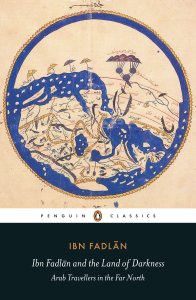
It always makes for an interesting read when two completely diverse and opposing parties come into contact. In his Risala, Ibn Fadlan provides a refreshing account of the interactions between the Norsemen and Muslims when he first encountered the Rusiyyah, a group of Vikings on the shores of the Vulga river. He leaves no stone unturned as he dissects their foreign culture and provides the only eye witness account of a Viking ship cremation of a slave girl. He makes clear his disapproval of the Vikings’ public fornications and their lack of cleanliness, yet admires them greatly for their strength. With several translations, the Abbasid traveller has left an underappreciated historical legacy, shedding light on a truly intriguing point in our Islamic history.
The Travels of Ibn Battuta:

Ibn Battuta is truly a treasure; having travelled to over 40 countries, he is appreciated for his journeys beyond the Arab world. He tells us of the Hagia Sophia before the Ottoman conquest, the vibrant cuisine of Somalia and the time he was ambushed by pirates on the Indian ocean. Truly fascinating were his encounters with the Anatolian Akhis, who were known for their hospitality by the virtue of futuwwa. Two separate brotherhoods drew knives just so they could be the ones to host their honoured guest. Ibn Battuta’s travels demonstrate the beautiful diversity that exists within our vibrant history.
PODCAST: Islamic History X
No one realised they were waiting for it until it dropped, but 2020 has blessed us with a bi-monthly podcast exploring our rich Islamic history. By taking a thematic approach, the Islamic History X podcast aims to traverse our monumental past without the constraints of chronology. The first season will explore a few rather underappreciated segments of our history: The spread of Islam in East Africa, the Islamic Emirate of Sicily and Islam in the Malay Archipelago whilst also delving into a fan favourite, Salah al-Din and the Fatimids. If you want to know why an Anglosaxon king minted coins that read the shahada, this is the place to find out!
BOOK CLUB: The Legacy Institute
The Legacy Institute aims to help reconnect and educate the world on Islams vast history and legacy. Offering a range of content from Arabic to Tafsir to recounting the Seerah, the hidden gem is the book club. Kicking off with Shaykh Abu’l Hasan Ali Nadwi’s book Islam and the World, the discussion examined the past on its own terms whilst also viewing it from the lens of today. If you missed the live discussions, the commentary is still available to access.
Aaminah Y. works in cardiology and dabbles in Islamic studies on the side. Her interests include history, politics and community development. She is currently based in London.
Ayah Aboelela is completing her undergraduate studies in computer science and Arabic. She is an enthusiast of Muslim fiction literature, is fascinated by history, and loves teaching the Qur’an to children in her Massachusetts Muslim community. You can follow her on Instagram @caveofkutub.

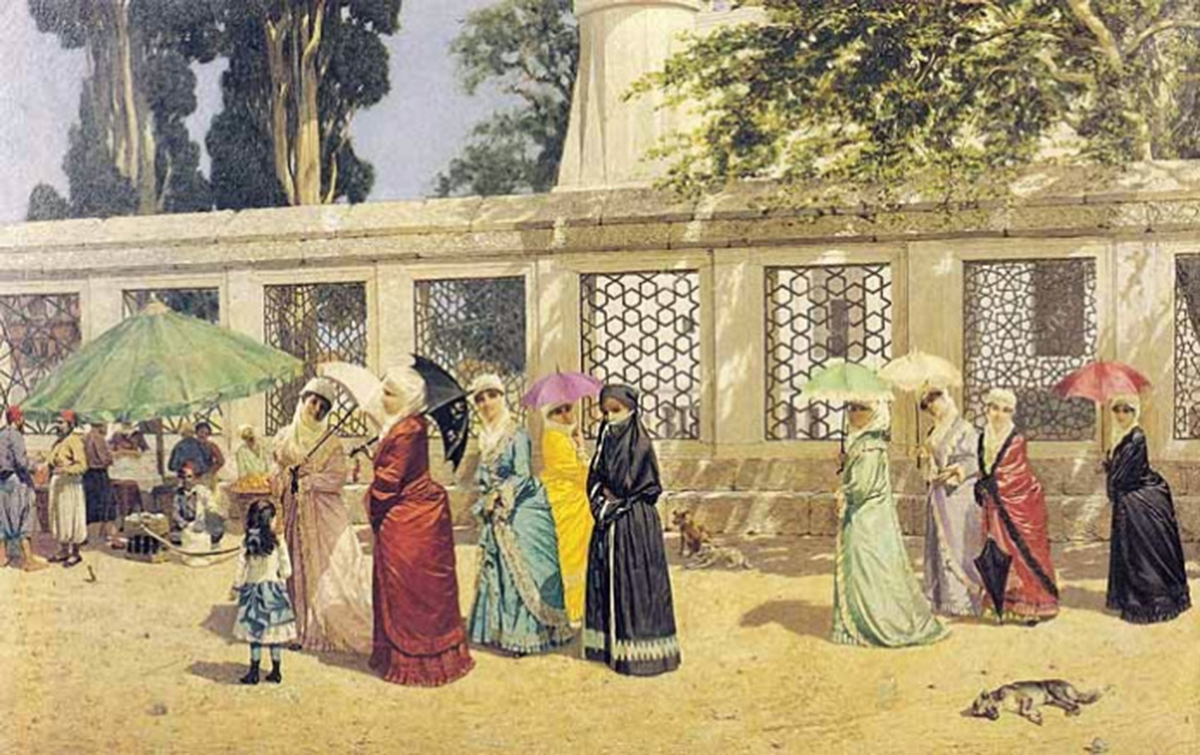
Ustadh Uwaimir Anjum teaches an amazing course on Islamic history on al-balagh academy
LikeLike